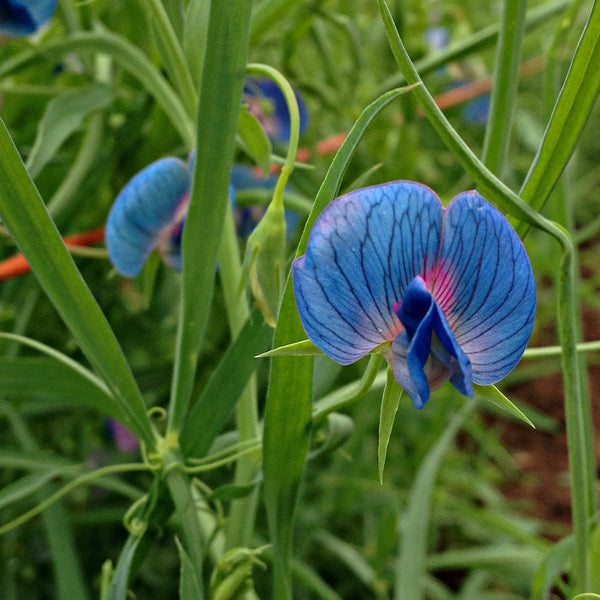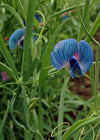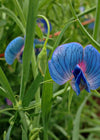Sweet Pea Sp., 'Azureus'
(Lathyrus sativus) Delicate nodding pea flowers of the most electric tropical blue color! One of our favorite flower varieties, it is an exceptional vine for tumbling from baskets, over walls as well as for borders and bouquets. Not a true sweet pea but a close relative, sometimes known as chickling vetch or “grass pea”, they are 2-3' and very drought-tolerant and long-blooming. Azureus is often grown as a cover crop for its ability to effectively fix nitrogen in a very short amount of time. Trellising, while not necessary, keeps it a bit tidier in tight spaces. Drought tolerant in the extreme, it is an ancient cultivated species and is an important food in Ethiopia and Bangladesh, as well as having culinary traditions in Spain and Italy where it is known as Cicerchia. Slow Food Italy has even gotten involved in preserving it as a traditional food of Umbria. (Look for our culinary variety in the 'misc beans' section). Considered toxic if consumed in significant amounts over extended periods. Also grown for animal grazing in China and India. Its lack of scent is eclipsed by its exquisite beauty. Grow it!
60-75 days. UO
Packet: 25 seeds
Product Code: VET-AZ-pkt
Availability:In stock
| Translation missing: en.products.general.options | Translation missing: en.products.general.qty | Translation missing: en.products.general.qty |
|---|---|---|
|
$4.50 |
||
|
$12.00 |
||
|
$28.00 |
Growing Info
SOWING:
Direct seed early Spring.
Note: Frost tolerant preferring cooler weather and well-drained, sandy soil. That said, they grow well in many types of soil including heavy clay. Avoid acidic soil.
Amazingly tolerant to drought.
PLANTING DEPTH:
1-2"
SPACING:
Sow 6-8 seeds per linear foot, thinning plants to 6", in rows 12-18" apart.
EMERGENCE:
10-15 days @ soil temp 50-70F
LIGHT:
Full sun
FERTILITY:
Low to average. Tolerant to most soil types but prefers soil with a pH between 6.0-7 and are sensitive to acidity.
ADDITIONAL NOTES:
Provide a short trellis to keep them upright.
Pinch when 6" to encourage branching.
One week vase life.
They are one of the best nitrogen fixing cover crops known and can be an excellent component of crop rotation and soil building regimen.




